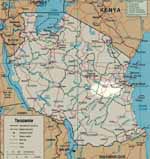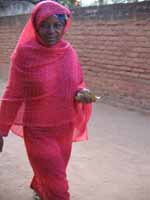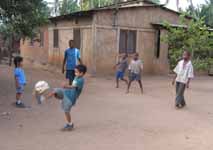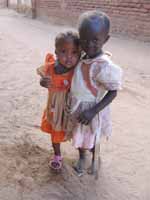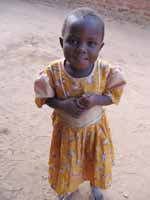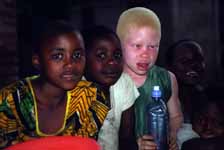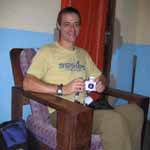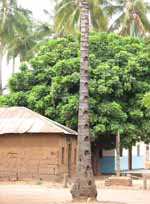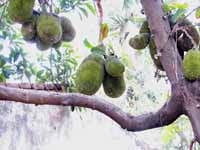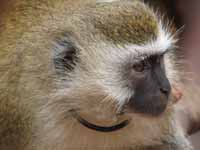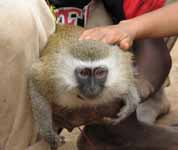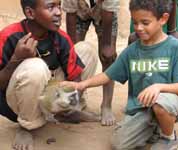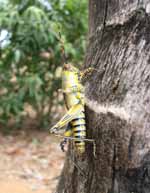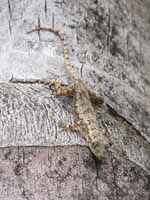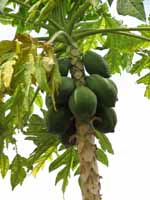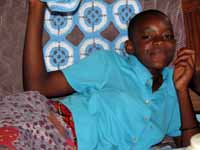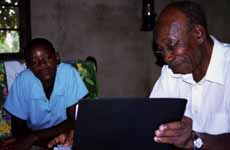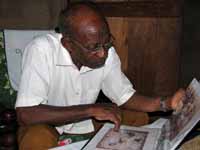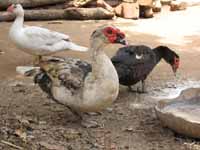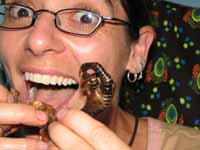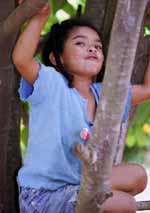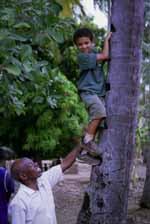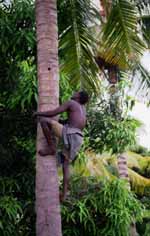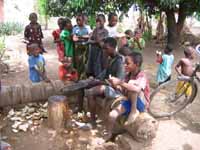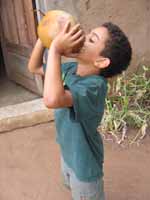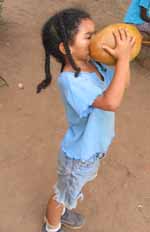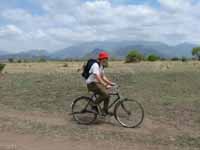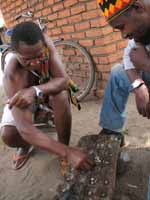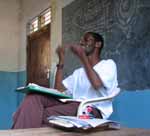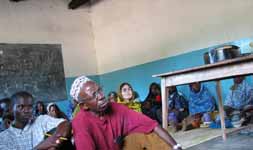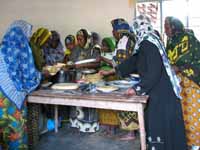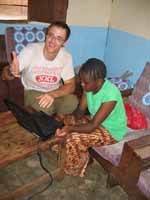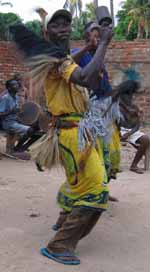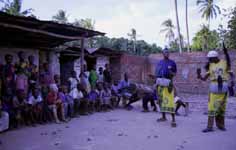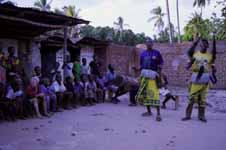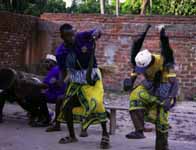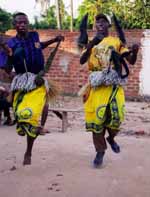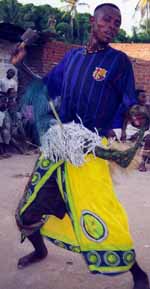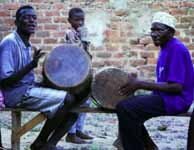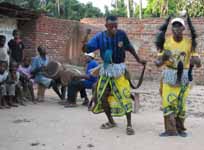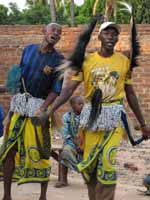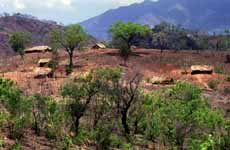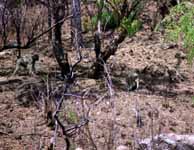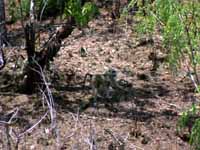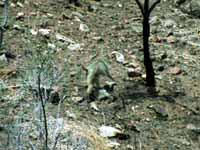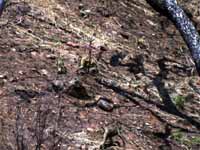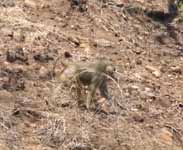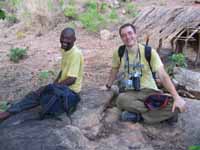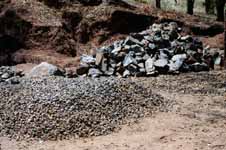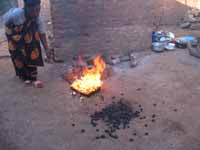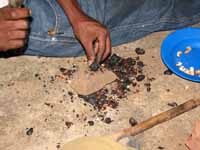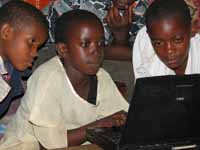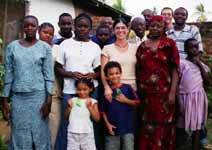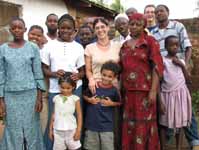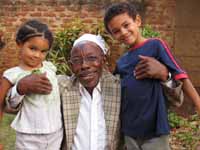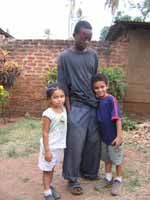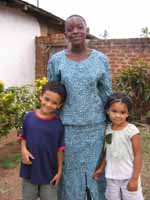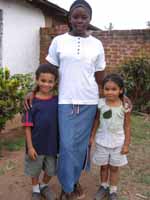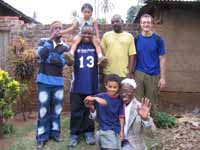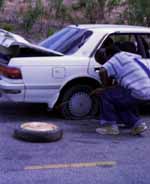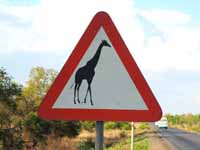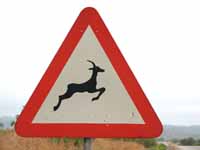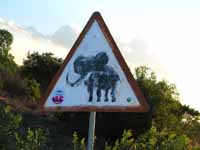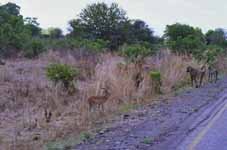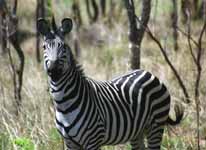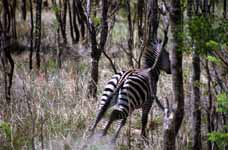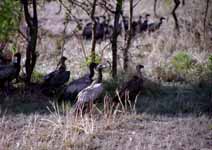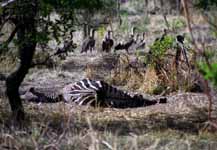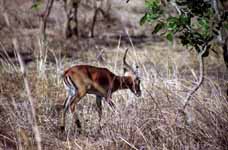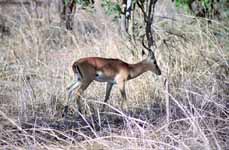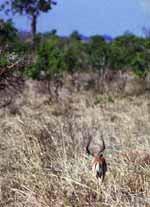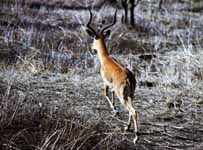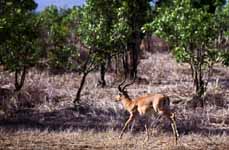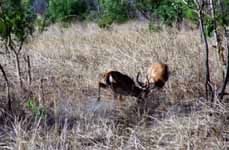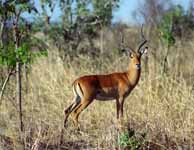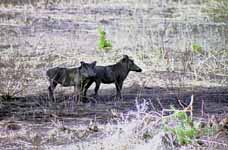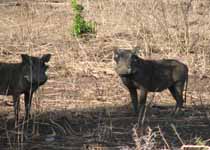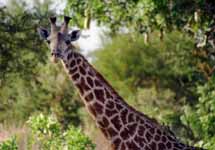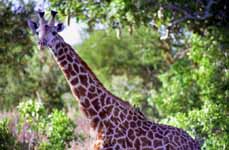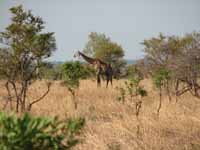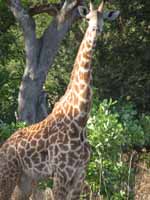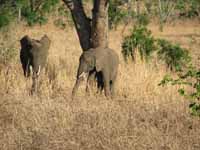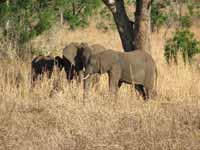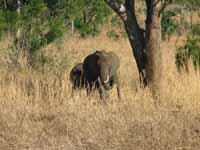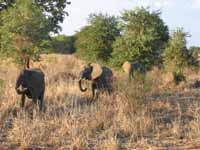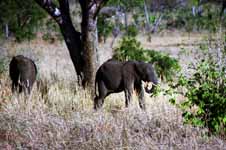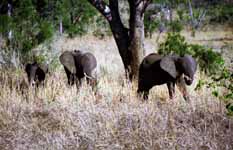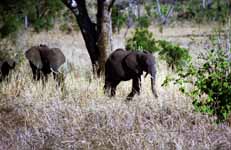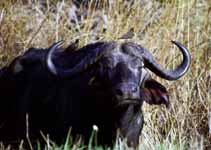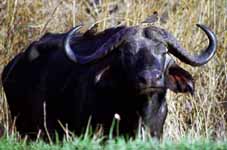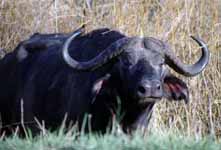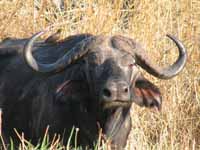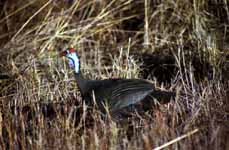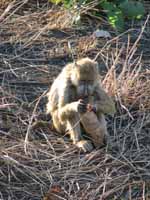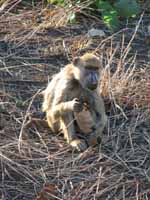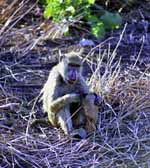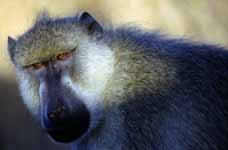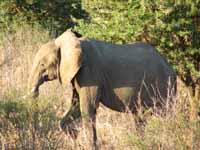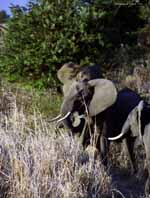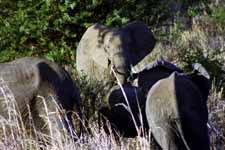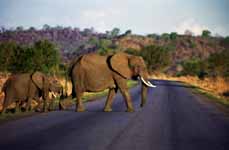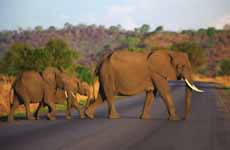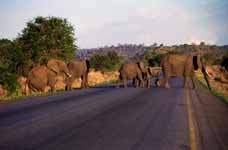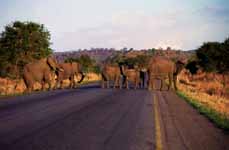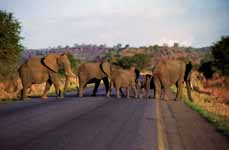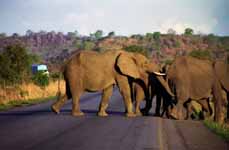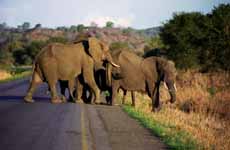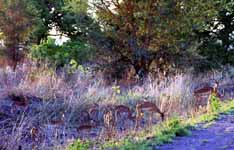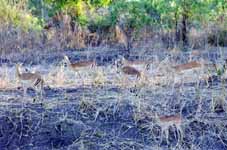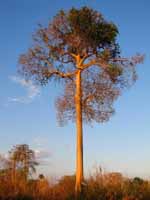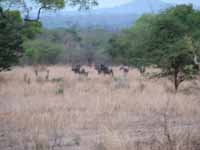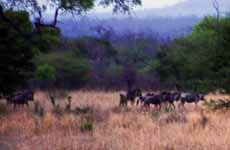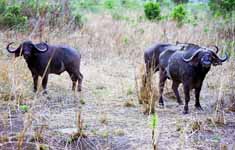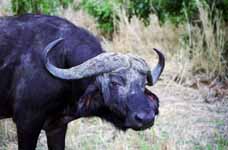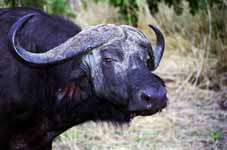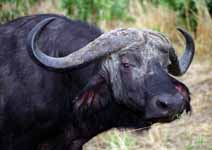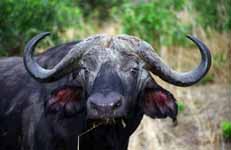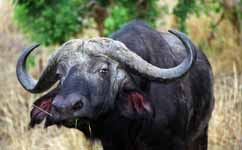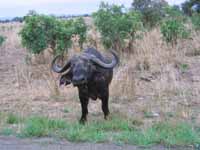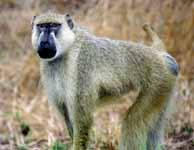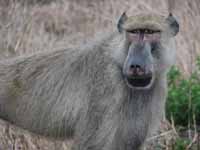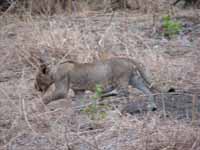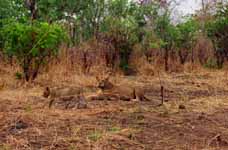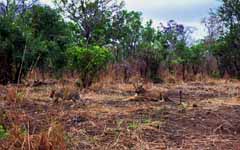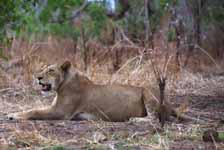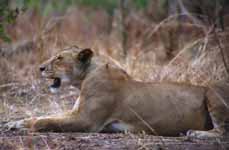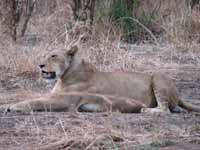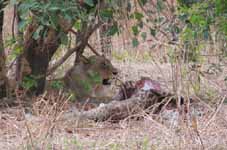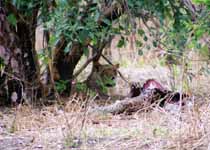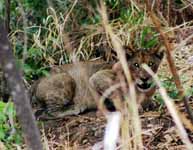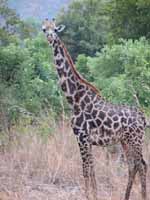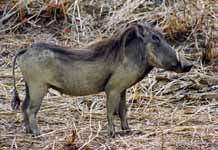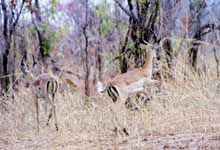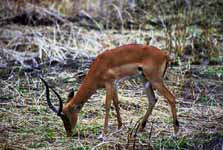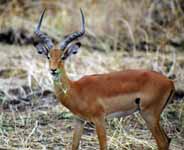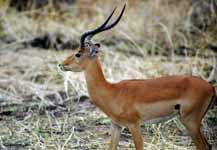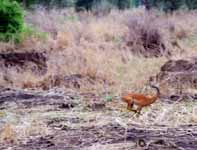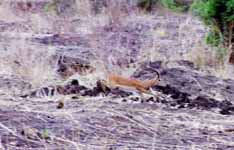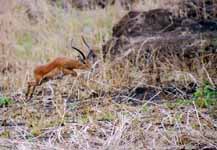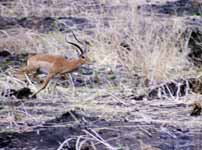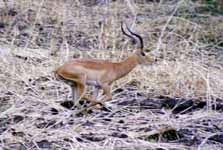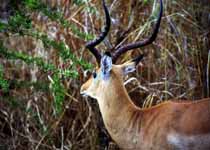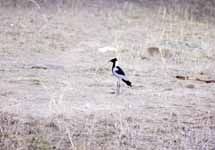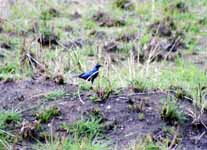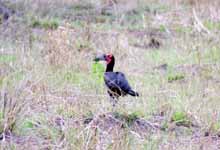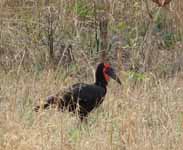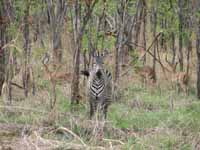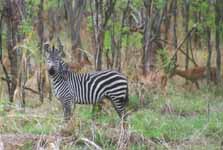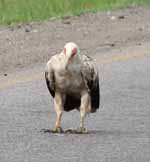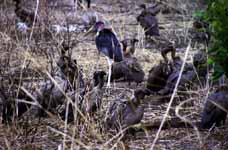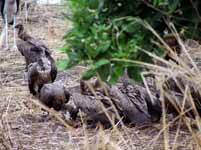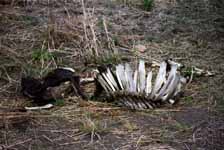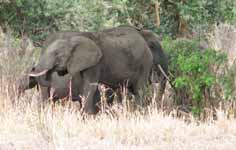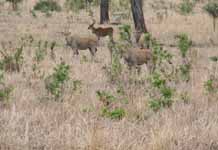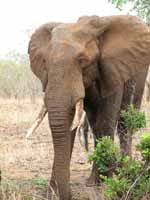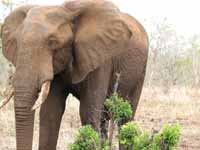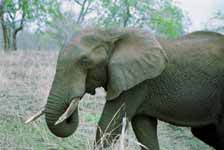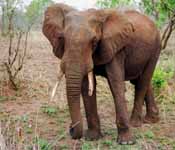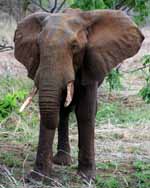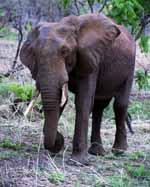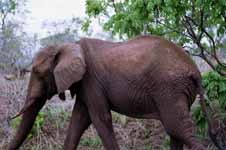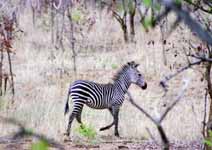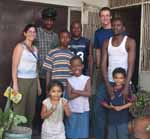Travel --- 11/19/2005 - 12/27/2005 --- Tanzania
12/5 Hussein's step-nephew Juma, who chauffeurs tourists for a living, picks us up to drive to Morogoro and Mvomero. It is a two hour drive to Morogoro, made a bit longer by the fact that one of Juma's tubeless tires has an inner tube. This tube is patched with glue that fails when it gets hot. Tanzania is hot. We get flat tires every single day we are in Juma's car. We make up time lost to changing flats by driving 80km/h... on dirt roads... directly at anything which happens to be in the road. Grand Theft Auto: Mvomero.
We stop in Morogoro to see Hussein's friend Michael. Then we continue on another 40km to Mvomero. Hussein's father and oldest sister (Mama Shaba) live here. Mama Shaba is a teacher, and she runs a corn mill, and she owns a guest house. Teaching doesn't pay well in Tanzania. The simple guest house is convenient for us because it gives us somewhere to stay.
I meet Hussein's dad, Mzee Chamhingo. He speaks flawless English, a result of going to school as a child when Tanzania was still a British colony. We discuss the changes he has seen in Tanzania during his life. The two biggest are universal primary school and automobiles. We also discuss perceptions of America. Almost too predictably, Tanzanians believe everyone in America is wealthy. They are shocked to learn that there are homeless people, unemployed people, and a huge number of working poor in America. Interestingly, in this very Muslim village, they do not object to America's war with Iraq. They feel it is justified self defense.
Nassor and Sophia are completely thrilled to meet all the kids in the village. And the kids are just as excited to meet them. They play soccer for hours. Nassor manages to kick his shoe on to the roof of the house next door. After we finish laughing, one of the older kids is able to retrieve the shoe.
12/6 Continuing my conversations, I talk with Mama Shaba about life in Mvomero. She loves the town, it has been her home for 21 years. But it is a hard place to live. There is no industry and plenty of idle, drunk young men (they harvest and ferment coconut juice). The main road was rerouted away from Mvomero and this has hurt business. Mvomero has electricity which is reliable the whole time we are there. It also has pipes for water, but they are dry the whole time. People retrieve water from one of two wells. There are at least three tractors in the village, but gasoline is so expensive that most farmers can't afford to hire them, so fields are tilled by hand or the occasional draft animal.
We spent the day at Mzee's house. Hussein gives his dad a portfolio of his artwork. Mzee pays a young man to climb his coconut tree and bring down a bunch of coconuts. This attracts a crowd of children who know what is coming next... we all drink Madafu, raw coconut juice straight from the shell. After this I am humbled at a game similar to jacks by Hussein's nieces Habiba and Fatuma.
Walking back to Mama Shaba's house, we meet Juma (no relation to our driver) a 6'4" Masai herdsman in full traditional regalia. He is Subira's friend, and the three of us chat for a bit (with Subira translating). I should have asked to take some pictures, but it actually didn't occur to me while we were talking. For dinner we have wonderful sweet noodles. This is the only time I find this dish in Tanzania. I don't recall the name, but it was excellent.
12/7 Subira and I borrow some bicycles and ride out to a Masai village about 5km from Mvomero. The village is little more than a collection of four mud huts and a few smaller shelters. Most of the men (including those Subira knows) are out with the herds and the women don't know Subira. I try to learn a little about their life. They are polite, but obviously not interested in talking. It was interesting to see how they lived. In some ways, not being welcome made it seem more authentic. In the Masai or other tribal villages where tourists are accepted, just their presences changes the reality of life. Even for villages which are authentic, not just created for tourists, there is a Heisenberg Uncertainty Principle that observing the village changes it. At least that is my theory.
Riding back we run into a Zigua friend of Subira's. We stop and talk for about two hours. They play Bao, a variant of Mancala which is played throughout Tanzania. Not knowing all the rules, I play one game and lose handily. Out in this area, the only water is the wells back in Mvomero. Vendors collect buckets and cart them out to sell for about 8 cents a bucket. Subira's friend has a well, but no pump. He hopes to have one in a year.
Returning to Mvomero, Rachel and I attend a lecture by Dr. Juma (no relation to our driver or the Masai herdsman) who is visiting from Zanzibar. He is teaching women in the village how to make a solar food dryer and how to add vegetables to their chapati (a tortilla-like food staple) to increase vitamin intake. I am a bit uncomfortable with being herded into the seat of honor at the front of the classroom and being served food before anyone else. But that is the way things go here. They also won't let me collect water, or cook, or clean, or help with anything. I talk to Dr. Juma after the lecture. He says that 6 million people in Tanzania are HIV positive. This is over 10% of the population, but is still much lower than the infection rate in other African countries.
In the evening we enjoy an amazing two hours of drumming and dancing. Mama Shaba's husband has hired a group (two drummers and two dancers) to perform for us (at a total cost of $6.80). Most of the village kids gather as the drummers heat their selo drums by a fire. The heat tightens the skins and improves the drum's tone. The performance is a traditional song and dance. It is in Zigua, so Rachel is only able to translate bits and pieces for me. It revolves around being welcomed to the village of Mvomero and life in the village.
We finish the evening with a sweet drink called rosera made from the petals of a flower. Rachel thinks she has the flower growing in her yard in Maryland. So maybe we will be able to drink more of this cranberry-like juice in the USA.
12/8 A local hunter, a boy about 12 years old, leads us on a hike outside the village. We go for a nice, long, hot walk through the countryside. Except for some of the hills and ridges, it is almost all farm or former farm land. We see about a dozen Vervet Monkeys.
Unfortunately, we suffer the loss of yet another roll of toilet paper this day. It is the third roll rendered unusable during the trip. To avoid embarrassing the guilty parties, I'll refrain from telling all details of each incident. Suffice it to say that I now have my personal roll of toilet paper well protected from those who are prone to careless toilet paper accidents.
Prior to dinner we are snacking on cashews. The cashews are roasted in the back yard, then Hussein and I spend an hour shelling them all. I am excited to finally be allowed to work, though it does become tiresome by the end of the hour.
12/9 Mzee gives us 2 liters of honey as a parting gift. I've never seen so much honey in my life. We say our goodbyes and depart Mvomero with Juma driving us to Mikumi National Park. Like all the parks, Mikumi is expensive. It would cost us over $100/day to travel inside the park. Plus we are paying for all of Juma's gas at over $4/gallon. We decide to do the poor man's safari through Mikumi. The main road to Iringa runs right through the park, and we can drive this road without paying the park entrance fee. Vehicle accidents were killing all of the park's wildlife once the road was paved. So now there are speed bumps every kilometer. It helps. If you ask most Tanzanians about the wildlife they have seen in the country they will tell you they have seen Giraffe or Elephants or Baboons. Almost always it turns out they were on a bus to Iringa at the time.
We drive back and forth on this road looking for animals. Our plan is to do at least one pass at sunset today and one pass during sunrise tomorrow. We end up making three passes on the 20km stretch of road each day. Today we see Elephant, Grant's Gazelle, Pheasant, Baboon, Cape Buffalo, Dikdik, Vultures and Zebra. I tell everyone to be sure to look up in trees for Lions as we drive. Rachel and Hussein tell me that Lions don't climb trees. I claim that they are cats and they must climb trees. Hussein tries an "I'm African so I'm right about this" argument, which holds no water with me. We see no Lions in trees, but I do not accept this as conclusive evidence one way or the other.
After finishing our tour and fixing the daily flat tire we settle in for the night in the town of Mikumi. We get decent rooms in the Internet Guest House for $2.55 per night. I ask about an Internet connection and not only don't they have one, but they don't even know about the Internet. It is just a word they used to name the hotel. They have communal sinks and showers, but none of the pipes have water. So it is another night of bucket baths.
12/10 Sunrise tour through Mikumi. In addition to the animals seen yesterday, we see Wildebeest, Impala, Mongoose, Bush Buck and a family of Lions eating a Giraffe. The Lions are on the ground, under a tree. I still do not accept this as a definitive answer to the tree climbing question. After finishing our three passes (and fixing the flat tire) we drive back to Morogoro. We are caught at a police checkpoint and have to pay a $1.70 bribe to pass. All of the busses I've been on have paid bribes, but this is the only time it happens to me in a car. We almost get caught at another checkpoint, but Juma shoots past in the style of Grand Theft Auto: Morogoro. The police have no vehicles or radios, so the chance of pursuit is low.
In Morogoro we have dinner with Michael and his family. Hussein buys Juma a used tire. On this tire we drive all the way back to Dar and reach Hanif's house late in the evening.
Trying to figure out who all the people are? Check out this genealogy chart that Rachel and Hussein made for me so I could identify all the family members we met.
| Back to Overview |
